Part-time faculty see need to move towards “parity” with comparable full-time pay rates
by Victoria Clinton & Sandi Raeber Dorsett, AFT 1493 Part-Time Faculty Negotiating Team Members
One of the items indicated as high priority by part-time faculty for our next negotiations is to define and work toward “parity.” The concept of parity in California community colleges means that part-time faculty salaries should be comparable to full-time faculty salaries for similar work.
The original impetus for defining parity was the state’s issuance of one- time parity money in 2000-2001 to try to help close the inequity in pay between part-time and full-time faculty. At that time the money from the state was applied to the part-time faculty pay schedule. In anticipation of possible ongoing parity monies, each community college district was asked by the state to define, through the local collective bargaining process, a parity goal. The parity goal is the percentage of full-time faculty duties that part-time faculty are also required to perform, and once established, the goal would be the percentage towards which negotiators try to move in future negotiations.
As no ongoing monies were forthcoming, our District did not agree to establish a definition of parity. Only one or two other districts state-wide did not define parity. Throughout the state, parity definitions established by other districts ranged from 75% to 100% and many adopted 87.5% as their parity goals. Through negotiations since that time, many districts have moved closer to their parity goals. Although the 3-5% raise our part-time faculty received in our new contract has increased the parity in our district slightly, part-timers still only earn between about 54% and 70% of what full-timers make, depending on the step and column on the salary schedule. (See chart below.) In community college salary comparisons, while most full-time salaries in our district now rank within the top 3 or 4 districts in the Bay Area, the majority of our part-time salaries still rank 5th or 6th, even after our last raise. (See chart below.)
In order to help the negotiating team, AFT 1493 will be asking both part-time and full-time faculty this semester to answer questions in an online workload survey on duties performed and the amount of time devoted to those duties. Defining parity is an important first step in a continuing effort to assure that part-time faculty join full-time faculty in achieving at least 3rd or 4th position in Bay 10 community college salary comparisons.
Percentage of representative full-time salaries earned by part-time faculty on SMCCCD salary schedule
| Base | MA | MA +45 |
MA +60 | PhD | |
| Step 5 | 68.26% | 65.48% | 64.16% | 62.30% | 61.26% |
| Step 10 | 70.70% | 68.22% | 67.04% | 65.27% | 61.74% |
| Step 16 | 65.33% | 63.18% | 62.16% | 60.59% | 57.54% |
| Step 23 | 60.60% | 58.74% | 57.85% | 56.43% | 53.79% |
The table above shows the percentage of full-time salaries at a representative range of steps earned by part-time faculty at the equivalent step and column on the part-time schedule, including pay for office hours.
SMCCCD full-time & part-time faculty salary rankings among Bay 10 community college districts
Full-Time Faculty Salary Rankings:
| Initial | Step 6 | Step 12 |
Step 18 |
Highest | |
| MA | 2 | 1 | 3 | 4 | 3 |
| MA + 60 |
2 | 1 | 4 | 3 | 4 |
| PhD | 2 | 1 | 4 | 5 | 5 |
Part-Time Faculty Salary Rankings:
| Step 5 | Step 10 |
Highest |
|
| MA + 60 | 6 | 3 | 4 |
| PhD | 5 | 5 | 6 |
The table above shows how SMCCCD faculty salaries rank among the Bay 10 community college districts. Almost all full-time salaries are at 1, 2, 3 or 4 in the Bay 10, but the majority of our part-time salaries rank 5th or 6th in the Bay 10 rankings.
CFT recommendations for California state ballot propositions
Below are the California Federation of Teachers’ recommendations for the California state propositions on the November 6 ballot. For more information, click on the propositions below or go to CFT.org.
![]() For a Voter Guide with a complete list of CFT’s recommendations for candidates and measures on your Nov. 6th local ballot, plus where to vote, click here.
For a Voter Guide with a complete list of CFT’s recommendations for candidates and measures on your Nov. 6th local ballot, plus where to vote, click here.
 Proposition 30 Yes!
Proposition 30 Yes!
Protects funding for education & public safety.
Proposition 31 No
Locks California into permanent underfunding of education, health, & other vital services.
Proposition 32 No!
Special Exemptions Act. Silences voice of educators in political process.
Proposition 33 No
Mercury Insurance sponsored proposal to allow rate hikes on low-income drivers.
Proposition 34 Yes
Repeals death penalty and replaces with life without parole.
Proposition 35 Yes
Increases penalties for human trafficking.
Proposition 36 Yes
Reforms Three Strikes Law.
Proposition 37 Yes
Labeling of genetically engineered foods.
Proposition 38 No Recommendation
Munger Initiative. Raises money for schools, but seen as rival to Prop. 30.
Proposition 39 Yes
Closes $1 billion loophole for multi-state corporations to fund clean energy program.
Proposition 40 Yes
A Yes vote upholds the process used to redraw State Senate district boundaries.
for San Francisco residents:
San Francisco Proposition A Yes
Save our City College
Click here for other S.F. ballot recommendations from AFT Local 2121
Freedom of speech, private communications threatened
District calls in D.A. after union staffer forwarded political email message; bizarre 6-month criminal investigation follows
by Dan Kaplan, AFT 1493 Executive Secretary
 On October 24, 2011, I forwarded an email to my AFT Local 1493 list (which consists of around 55 colleagues of mine in the San Mateo Community College District and in a few other community college districts) that was entitled “I don’t want to be alone” and written by a candidate who was then running for a seat on the San Mateo Community College Board of Trustees. A couple of months later, the District forwarded my email to the San Mateo County District Attorney.
On October 24, 2011, I forwarded an email to my AFT Local 1493 list (which consists of around 55 colleagues of mine in the San Mateo Community College District and in a few other community college districts) that was entitled “I don’t want to be alone” and written by a candidate who was then running for a seat on the San Mateo Community College Board of Trustees. A couple of months later, the District forwarded my email to the San Mateo County District Attorney.
The District Attorney’s office launched an investigation into my forwarding this email to my personal, professional mailing list. The allegation was that my forwarding of this email violated the California Education Code section 7054, and could be either a misdemeanor or a felony offense. I learned that if convicted of a felony charge, I could spend up to a year in jail for forwarding one political email message to my colleagues. AFT’s lawyer advised the DA that the District’s email system had become a public forum by practice, with access protected by the Constitution. Evidence showed that Board members, the administration, and another organization had used it for extensive political advocacy, and that the law does not apply to non-District employees (such as me).
Thus began a surreal saga for myself and the leadership of AFT Local 1493. The ordeal, which felt at times like a bad spy novel, finally came to an end July 12, 2012, with the receipt of another email. This concluding message was sent by an investigator in the District Attorney’s office to our union’s lawyer. It said, among other things, “[I want to] let you know that my report and your submission on the topic have been reviewed by a prosecutor and this office has decided that there is no basis for further action. I will be closing this investigation. I have advised the District [the SMCCD] of this decision.”
Though I had assumed that, as someone accused of felony offenses, I would have the right to read the charges that had been alleged against me, neither I nor AFT 1493’s attorney are legally entitled to a copy of the DA’s or his investigator’s report, so we have not received any report. No DA’s office has an obligation to provide the target of an investigation with a copy of the reports they have prepared, even after the target of the investigation, who incurred significant legal expenses, has essentially been vindicated.
I can only speculate
Without the DA’s report, I can only speculate, based on the evidence I do have, on why the District would choose to pursue what ultimately must be deemed a frivolous and intimidating charge, which naturally would have the effect of chilling free speech.
Exhibit One: The Offending Email
The email I forwarded to a select list of my colleagues was from the sole candidate for the SMCCD Board of Trustees that AFT 1493 had endorsed, a non-incumbent. However, because the email I had forwarded was essentially no different from campaign email messages that sitting Board of Trustee members had sent on their own behalf to District employees in past election campaigns, I suspect that the DA’s report came to the same conclusion I and many others came to, namely that I had done nothing wrong, and that the impetus behind the allegations against me was punitive and retaliatory against our union for not having endorsed incumbent Board members.
Exhibit Two: The Time Line
On November 7, 2011, a change to Board Policy 2.30, which purports to lay out employees’ rights and limits regarding political activity, was agendized at the District Shared Governance Council (DSGC) for a first reading. The sole change being proposed to the policy was the addition of this sentence: “Violations of this policy may be forwarded to the County of San Mateo District Attorney’s Office for prosecution.” In her presentation to the Council of this proposed change, Vice Chancellor Barbara Christensen revealed that the District monitors employees’ email activity and found what was considered to be illegal political activity in employee email messages. The revised policy was passed (though not unanimously) at the next meeting of the DSGC (December 5, 2011.) Though any employer is always at liberty to forward information to the DA when it suspects employees have broken the law, I find the timing of this, essentially, unnecessary and intimidating change to Board Policy 2.30 quite coincidental given the fact that I had forwarded the email from the AFT-endorsed Trustee candidate two weeks earlier. In fact, the Board of Trustees did not pass this revised policy until December 14, 2011, a full seven weeks after I forwarded that fateful email message.
The Result: Legal fees that could feed a family of four for a decade
So in the end AFT Local 1493 spent tens of thousands of dollars in legal fees to address what turned out to be unsubstantiated and frivolous allegations. Now pending with the Public Employee Relations Board (PERB) is an Unfair Labor Practice charge that AFT 1493 has initiated against the District. The remedy that AFT seeks is that the District should pay all of our legal expenses in this matter.
Legal Opinion
Attorney sees many likely reasons why the D.A. would ultimately reject the District’s complaint
by Robert Bezemek, AFT 1493 Attorney
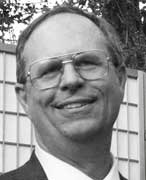 While one cannot identify with certainty all of the factors which resulted in the closing of the criminal investigation, several were surely persuasive. Foremost, that the statute does not, by its terms, apply to non-employees of a college district. Second, because the statute regulates freedom of speech, its provisions must be narrowly construed, and it will be applied only where there is a compelling governmental interest — there can hardly be such an interest in occasional, sporadic, or limited emails which simply forward political advocacy. Third, there is ample evidence in San Mateo that its email system is a designated public forum, based upon historic practice. Board members, students, classified employees, organizations, and faculty have all sent or received some political emails during election periods. And many newspapers with political advocacy are routinely delivered through the system. Further, the system is available to anyone, regardless of one’s political beliefs. Even the District administration sent an email to employees which implicitly supported a District-supported ballot initiative.
While one cannot identify with certainty all of the factors which resulted in the closing of the criminal investigation, several were surely persuasive. Foremost, that the statute does not, by its terms, apply to non-employees of a college district. Second, because the statute regulates freedom of speech, its provisions must be narrowly construed, and it will be applied only where there is a compelling governmental interest — there can hardly be such an interest in occasional, sporadic, or limited emails which simply forward political advocacy. Third, there is ample evidence in San Mateo that its email system is a designated public forum, based upon historic practice. Board members, students, classified employees, organizations, and faculty have all sent or received some political emails during election periods. And many newspapers with political advocacy are routinely delivered through the system. Further, the system is available to anyone, regardless of one’s political beliefs. Even the District administration sent an email to employees which implicitly supported a District-supported ballot initiative.
America has a long tradition of recognizing and protecting political speech at public and many private colleges and universities. In fact, before the American revolution, political opinions were expressed by colonists in Harvard Yard. One can imagine then all of these factors, including the courts’ historic protection of the “marketplace of ideas,” contributed to the decision to reject the District’s complaint.
Attention faculty: Big brother may be watchingDo you use your District-provided faculty email address for anything besides District communication? Say, to get education discounts on your subscription to the New York Times or to tell your spouse you’ll be home late or can’t take the dog to the vet? Do you get subscription mailings from Facebook, Moveon.org, or your political party affiliations? Well, whatever you use your SMCCD email for besides work-related communication, you might want to rethink your choices, especially if you don’t want your employer to read those quick updates you’ve been sending back and forth to your spouse, kids, and friends. Though AFT Executive Secretary Dan Kaplan was, in fact, NOT charged by the District Attorney with any wrongdoing for using his District email account to forward an email message to a select group of colleagues, AFT was astounded at the breadth and depth of the District’s reach when it casts its net in search of possible misconduct. In response, the AFT Executive Committee has ceased using the District email address for union business (with the exception of all-faculty email messages, which we cannot send from outside of the District’s system), not because we feel our past use of District email was unjustified, but because we want to keep our faculty union’s internal communication private. All AFT reps now have union email addresses in the format of <lastname@aft1493.org>. While AFT’s right to communicate with its members and fee payers in the workplace emphatically includes our right to use the District email system, we are researching other communication methods that might allow faculty to choose how and where to read important electronic information from their union. In the meantime, we thought we’d share our experience as we imagine that you, too, might want your personal communication to stay that way—personal and private. We’re just saying. |
Lessons of the Chicago teachers’ strike
by Dan Kaplan, AFT 1493 Executive Secretary
The recently concluded Chicago teacher’s strike was a major labor victory, and one of the most important union struggles in many years. The Chicago Teachers Union (CTU) did the seemingly impossible: The Chicago teachers walked out for seven days in a strike that challenged every tenet of the corporate agenda for overhauling public education. It was a battle of two conflicting visions of the future of public education.
Mayor Rahm Emmanuel, the Chicago School Board he appointed, Secretary of Education Arne Duncan, who previously ran the Chicago schools, and education “reform” organizations around the country, such as the Gates and Lumina Foundations, are pushing to privatize public education by creating profit-making opportunities. And as new charter schools are opened and new curricula and tests are adopted, they want to implement merit pay schemes for teachers based on the standardized test results of their students.
In contrast, the Chicago Teachers Union believes public schools are necessary community institutions, so the teachers went on strike for small class sizes, for the development of a rich curriculum with more art and music than standardized tests, and for the hiring of more social workers, nurses, and counselors to help students beat back the effects of poverty on their chances of academic success. Chicago teachers believed so strongly in this vision of education for all that they risked legal sanctions and personal financial hardship.
Ultimately, the CTU was able to defeat two national trends–merit pay and evaluations based on student test scores–and held on to significant other gains in their contract regarding class size. Remarkably, this happened at a time when education unions across the country are being forced to accept merit pay, a major blow to the unions and to seniority.
But the political lessons to be learned from the Chicago teachers’ strike also apply to the U.S. labor movement as a whole. And for that reason it is important to understand why the Chicago’s teachers’ struggle was successful.
1. Community mobilization is crucially important. When Mayor Emanuel and his handpicked school board targeted 17 schools for closure earlier this year, the CTU joined parents and community activists in a grassroots mobilization to save the schools. On the first day of the strike, 30,000 rallied for the teachers in the Loop.
2. If you fight, you can win. In the fifth year of a depressed economy, union concessions have become routine. But the Chicago teachers showed a different way. Striking doesn’t automatically guarantee a victory, of course. But failing to fight back only guarantees a further retreat.
3. Union members must not only be mobilized, but organized. The “mobilization model” of unionism has become the norm for progressive labor organizations. Holding big protests and building alliances with community and social movement groups have become fairly common tactics for many unions. But there’s a difference between sending busloads of workers to a protest and a systematic effort to build organization inside and outside the workplace. The CTU’s internal organizing was directed at making the union a responsive and effective organization at every school site. And this prior organizing was the central reason why the strike was successful.
4. Social movement unionism is essential, especially in the public sector. Since the mid-1990s, unions have been more likely to engage with community and faith organizations and various social struggles. Labor’s support for the Occupy Wall Street movement last fall was another important step in that direction.
5. Local unions don’t have to accept concessions even if their national union has. By opposing merit pay and defending tenure rights, the CTU stood firm even though its national affiliate, the American Federation of Teachers (AFT), had retreated.
6. Public-sector unions don’t have to accept givebacks just because politicians demand them. In California, Governor Jerry Brown has demanded and received major concessions on pay and benefits from public-sector unions. The CTU refused to do this, and in the process made clear to the public that both Democrats and Republicans are attacking teachers’ unions in the name of “reform.”
7. Public-sector unions can lead the wider labor movement in the fight against austerity. The CTU strike was able to win popular support by arguing that the real problem was the city’s priorities of tax cuts for business, instead of money for education. To withstand the current onslaught, public-sector unions everywhere will need to follow the CTU’s example and point out how the services they provide benefit all working people.
8. Union democracy is essential to rebuilding the labor movement. CTU delegates made the decision to extend the strike into a second week in order to have time to discuss a tentative contract agreement with members at each school site. It was a lesson in union democracy that should be learned throughout the labor movement.
9. Finally, to be effective, a teachers strike needs to shut down the functioning of a school system. The CTU’s constant mass rallies reinforced a sense of solidarity among members and galvanized community support.
The Chicago teachers’ victory, along with the Occupy Wall Street movement (closely linked to many unions) and the upsurge of public workers in Wisconsin, may signal a reawakening of activism in the U.S. labor movement. Now, in the last few weeks, workers at Walmart, one of the most powerful corporations in the U.S., have conducted a successful strike for better pay and working conditions. The CTU showed the alternative to the dismantling of public education, to accepting cutbacks and to union passivity. We’ll see if others follow their lead.
Performance Evaluation Task Force begins information gathering with goal to improve evaluation procedures
by Nina L. Floro and Elizabeth Terzakis, Performance Evaluation Task Force Members
As you may have heard last Spring semester, the Performance Evaluation Task Force (PETF) was formed to review, evaluate, and revise the procedures and instruments currently in use for all levels of instructional and non-instructional faculty evaluation. Elizabeth Terzakis 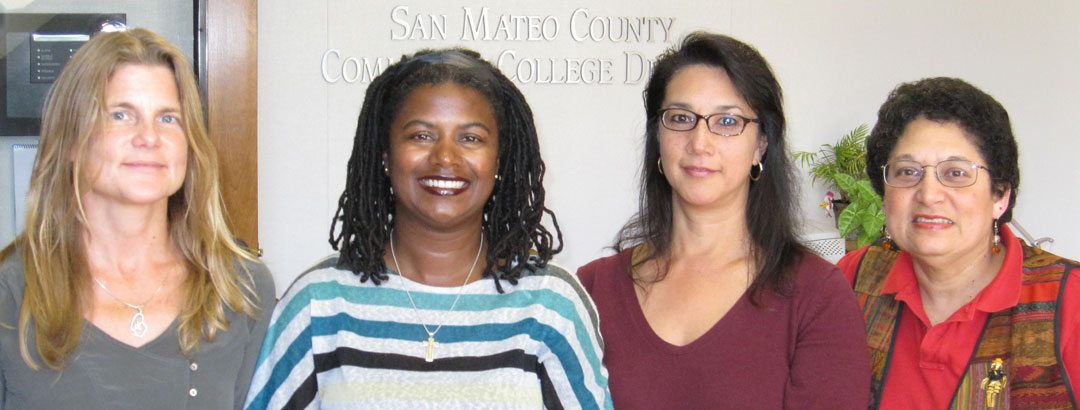 (English, Cañada), Lezlee Ware (Political Science, Cañada), Nina L. Floro (English, Skyline) and Tania Beliz (Biology, CSM) [from left to right in photo] were selected jointly by the District Academic Senate and AFT 1493 to serve as the PETF faculty members. District-appointed members of the Task Force include Regina Stanback Stroud, President of Skyline College, and Harry Joel, Vice Chancellor of Human Resources and Employee Relations.
(English, Cañada), Lezlee Ware (Political Science, Cañada), Nina L. Floro (English, Skyline) and Tania Beliz (Biology, CSM) [from left to right in photo] were selected jointly by the District Academic Senate and AFT 1493 to serve as the PETF faculty members. District-appointed members of the Task Force include Regina Stanback Stroud, President of Skyline College, and Harry Joel, Vice Chancellor of Human Resources and Employee Relations.
On September 14, District Academic Senate President, Diana Bennett, and AFT 1493 President, Teeka James, met with PETF faculty members to review the charge of the committee and to outline expectations that the Senate and AFT have of the PETF faculty members.
Faculty and administrative members of the PETF met on October 15 to discuss strategies to help them accomplish their work, which include soliciting feedback from faculty and administration; developing a timeline to help guide the PETF in its work; researching effective processes and tools in place at other institutions; reviewing, assessing, and discussing information that has been gathered; and revising/developing evaluations procedures and instruments to reflect current practices, standards, and methods, among other considerations.
Information-gathering efforts have begun at all 3 campuses. At Skyline College, for example, Nina Floro and President Regina Stanback Stroud have scheduled faculty evaluation input and discussion drop-in sessions for October 12 and November 2. In addition to soliciting feedback via e-mail and phone, plans are being made to gather information at Skyline’s leadership (management) team meetings, division/department meetings, as well as during discussions with individual faculty and present/past Deans. Nina and President Stanback Stroud will continue to consider and devise other information gathering methods, such as an online e-suggestion box accessible via the Skyline College website, in order to encourage and facilitate a broad range of input at Skyline.
At Cañada, Lezlee Ware and Elizabeth Terzakis held a Faculty Focus Group on Tuesday, October 16 and will be meeting with Deans and other administrators to discuss the evaluation process on November 6. They have also held discussion with faculty from other campuses to find out what they like and don’t like about their systems of evaluation.
All members are working on a survey that will go live after the next PETF meeting on November 12th.
New AFT 1493 Executive Committee members Lin Bowie and Sarah Powers introduce themselves
Five new members were elected to serve on the AFT 1493 Executive Committee for a two-year term for the 2012-13 and 2013-14 academic years. Each will be introducing themselves in The Advocate. In the last issue Michelle Kern, CSM’s new AFT 1493 Part-Timer Rep., introduced herself. In this issue, Lin Bowie, CSM’s new Executive Committe Representative, and Sarah Powers, new Skyline Part-Timer Co-Representative, provide some background about themselves below. -ed.
CSM’s Lin Bowie brings environmental background to AFT leadership
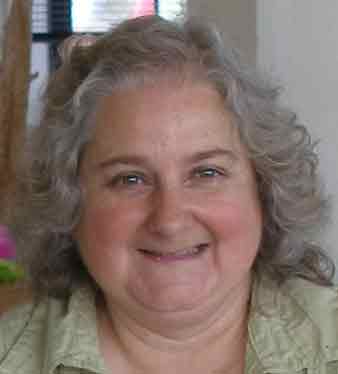 I am a part-time instructor in the CSM Biology Department. I began teaching at CSM in 2002 in floristry and horticulture. Prior to coming here to teach, I attended classes at Skyline in the 1980’s and at CSM starting in 1999. My children both graduated from CSM and transferred to 4-year colleges. They are both in graduate school working on their master’s degrees. I have lived in San Mateo County since 1979.
I am a part-time instructor in the CSM Biology Department. I began teaching at CSM in 2002 in floristry and horticulture. Prior to coming here to teach, I attended classes at Skyline in the 1980’s and at CSM starting in 1999. My children both graduated from CSM and transferred to 4-year colleges. They are both in graduate school working on their master’s degrees. I have lived in San Mateo County since 1979.
I caught the teaching bug when I was taking floristry classes and started assisting the instructors on the science-based curriculum. I enjoyed the experience so much, that I decided in 2007 to retire from my full-time job in environmental consulting and begin a teaching career. I took on several horticulture classes after an instructor retired and continued to teach floristry courses. Then, in 2009, the biology department needed somebody to teach Biology 110 and I eagerly accepted the assignment because biology was my first love. I have continued to teach general biology courses since then.
I developed my interest in life sciences in elementary school and decided to go to college for a biology degree. I graduated from Knox College in Illinois in 1974 with a B.A. in biology, I entered graduate school the same year at the School of Forestry at UC Berkeley and I completed my master’s program in range management in 1977. I worked for the U.S. Forest Service and the University of California, and then was hired as biologist for Pacific Gas and Electric Company, where I worked on many natural resources, health and safety, and alternative energy projects. Many of the alternative energy proposals are becoming implemented today, something I am glad to see happening.
I left PG&E in 1992 to help start up a woman-owned environmental consulting firm. The firm grew to over 100 people. We specialized in assisting clients to build large infrastructure projects in compliance with environmental regulations, but also on-time and on budget. It was rewarding for me to learn and practice sound business principles yet meet all of the important environmental protection measures. I built on my biology knowledge, but expanded into other environmental technical areas as well. I also had the freedom here to manage employees in some of the new ways that many start-up firms practice. The industry we served can be challenging, especially for women. I had promoted diversity hiring and job sharing at PG&E and I built on that at the consulting company. We respected the idea that our human resources were our greatest asset. For a small business, we worked hard to provide a supportive and rewarding working environment for our employees.
I joined the Union because I wanted to continue to advocate for the human resource element of our colleges. I hope to eventually bring some of my background to the challenges faculty currently face in community college education.
Skyline’s Sarah Powers is passionate advocate for part-time faculty
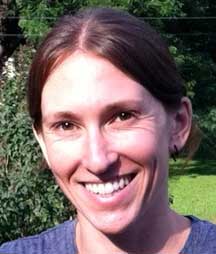 I am Part-Timer Co-Representative (with Doug Sherman) for Skyline College. I grew up in Michigan where I earned a B.A. in Secondary Education in 2005 and then began my teaching career as a 7th and 8th grade English and Social Studies teacher. I have done M.A. work in TESOL at Northern Arizona University in Flagstaff, and in 2011 earned a M.A. in English Composition and a certificate in Teaching Post-Secondary Reading from San Francisco State University. Since then, I have been teaching reading and composition classes at Skyline and SFSU. I am honored to represent part-timers and I will work to address their concerns and to create the best possible conditions for teaching and learning. In addition to my teaching and union work, I am a co-advisor for Skyline’s Gay-Straight Alliance. I am also a competitive cyclist and a Crossfit instructor. In my spare time, I enjoy reading comic books and eating pizza.
I am Part-Timer Co-Representative (with Doug Sherman) for Skyline College. I grew up in Michigan where I earned a B.A. in Secondary Education in 2005 and then began my teaching career as a 7th and 8th grade English and Social Studies teacher. I have done M.A. work in TESOL at Northern Arizona University in Flagstaff, and in 2011 earned a M.A. in English Composition and a certificate in Teaching Post-Secondary Reading from San Francisco State University. Since then, I have been teaching reading and composition classes at Skyline and SFSU. I am honored to represent part-timers and I will work to address their concerns and to create the best possible conditions for teaching and learning. In addition to my teaching and union work, I am a co-advisor for Skyline’s Gay-Straight Alliance. I am also a competitive cyclist and a Crossfit instructor. In my spare time, I enjoy reading comic books and eating pizza.
Daughter of CSM instructor wins AFL-CIO college scholarship
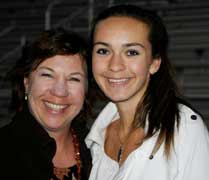 Leia Alex (at right in photo), of Soquel, CA, was awarded one of fifteen Union MasterCard Scholarships, sponsored by the AFL-CIO Union Privilege program. These highly selective scholarships are given only to those students in union families who have demonstrated achievement, character and social commitment. Leia’s mother, Rebecca Alex (at left in photo), a studio art instructor, is a member of AFT Local 1493 and the Cabrillo College Federation of Teachers. Leia fell in love with travel and culture as a young girl when her mom taught for CSM’s Study Abroad program in London and Florence. Leia is also an avid artist and was named a Congressional Art Participant as well as a California Arts Scholar in 2011. Combining her love of travel and art, Leia earned her Girl Scout Gold Award, the highest honor in scouting, by helping children in Morelia, Mexico, paint a 12’ x 62’ mural in their orphanage backyard, a converted junk yard. Leia’s experience working with the children and seeing how art transformed their lives and environment was an epiphany for her. She writes, “for me, art is a vehicle for understanding and communicating with other cultures.” Leia is now a freshman in the School of Foreign Service at Georgetown University, studying Culture and Politics. Her goal is “to better people’s lives and create equality with cultural diplomacy and with art as my tool for communication.”
Leia Alex (at right in photo), of Soquel, CA, was awarded one of fifteen Union MasterCard Scholarships, sponsored by the AFL-CIO Union Privilege program. These highly selective scholarships are given only to those students in union families who have demonstrated achievement, character and social commitment. Leia’s mother, Rebecca Alex (at left in photo), a studio art instructor, is a member of AFT Local 1493 and the Cabrillo College Federation of Teachers. Leia fell in love with travel and culture as a young girl when her mom taught for CSM’s Study Abroad program in London and Florence. Leia is also an avid artist and was named a Congressional Art Participant as well as a California Arts Scholar in 2011. Combining her love of travel and art, Leia earned her Girl Scout Gold Award, the highest honor in scouting, by helping children in Morelia, Mexico, paint a 12’ x 62’ mural in their orphanage backyard, a converted junk yard. Leia’s experience working with the children and seeing how art transformed their lives and environment was an epiphany for her. She writes, “for me, art is a vehicle for understanding and communicating with other cultures.” Leia is now a freshman in the School of Foreign Service at Georgetown University, studying Culture and Politics. Her goal is “to better people’s lives and create equality with cultural diplomacy and with art as my tool for communication.”
Union scholarships for AFT members and dependents
The CFT offers scholarships to high school seniors and college students who are children or dependents of CFT members in good standing. Students enrolled in four-year courses of study are eligible for $3000 scholarships; those enrolled in two-year courses of study are eligible for $1000.
Award selection is based on academic achievement, special talents and skills, participation in extracurricular activities, community service, financial need, and a 500-word essay on a social issue of the applicant’s choice. Scholarships are awarded for any one year of higher education. Students who received scholarships as seniors are not eligible for another scholarship during college. Continuing college students and dependents of deceased CFT members are eligible.
The deadline for high school seniors to submit applications is January 10. The deadline for continuing college students is July 1.
More scholarships and professional grants are available to members and their dependents through the AFT and the AFL-CIO.
For more information, contact Dan Kaplan at the AFT office at x6491, or go to cft.org.
.
